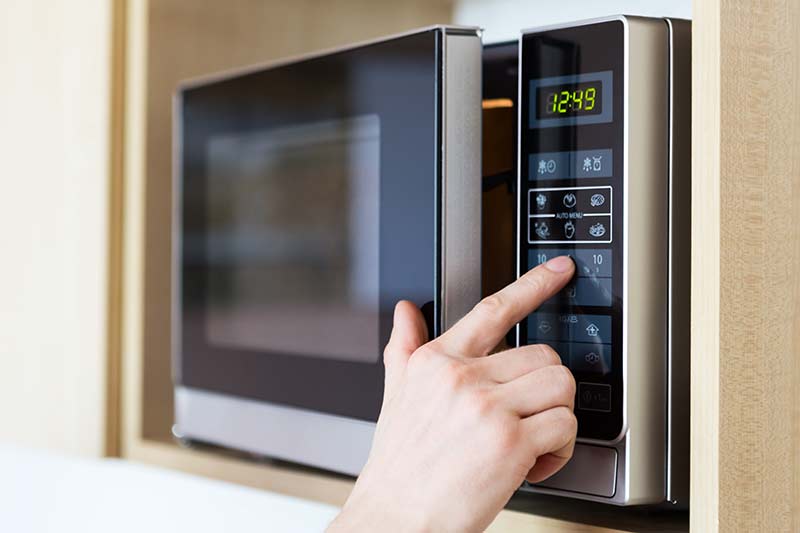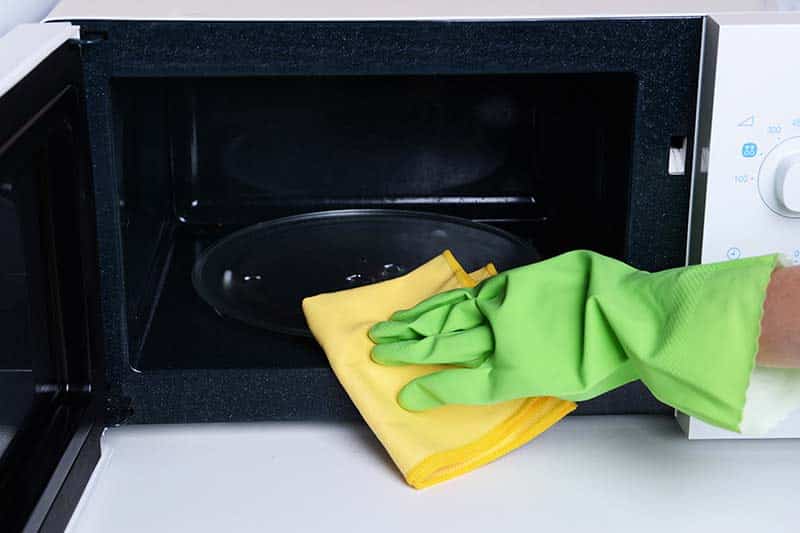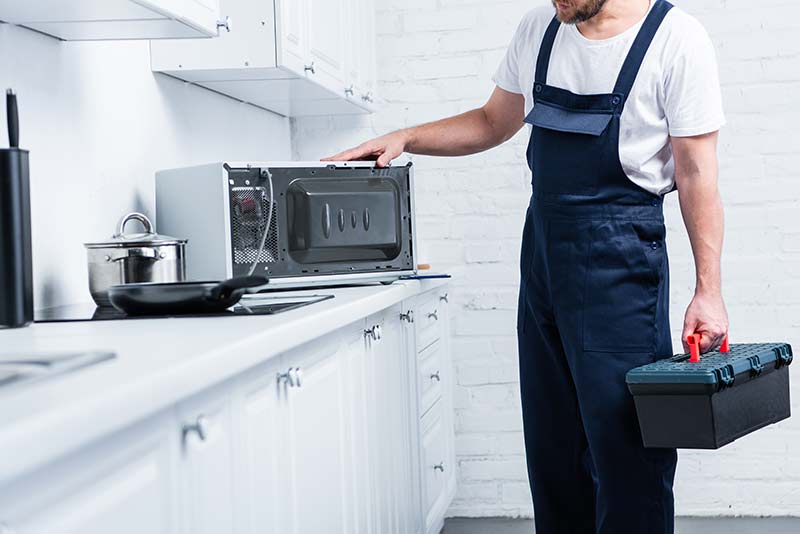We've independently reviewed this article to make sure it's as accurate as we can make it.
To find out more about our article creation and review process, check out our editorial guidelines.
Are you wondering how long do microwaves last?
You’ve come to the right place! Understanding the lifespan of your microwave can help you plan for its replacement and budget accordingly.
The lifespan of a microwave can vary depending on the frequency of maintenance, type, brand, and extent of use. A well-maintained microwave can last up to 10 years.
Read on to learn more about how long a microwave should last!
Why trust us? This article was written by Craig Anderson and James Blackford.
Craig has helped thousands of other homeowners repair their appliances since 2016. James is one of our resident appliance experts with over 16 years of experience. He currently works as a Master Technician for SquareTrade, and runs his own appliance repair business.
How Long Does a Microwave Last?
Your microwave’s lifespan will vary depending on multiple factors.
You see, if a microwave is well maintained through regular cleaning, ensuring proper ventilation, and using only safe-microwave containers, it can last up to 10 years.

Unfortunately, in many busy households, a microwave doesn’t usually see past its 5th birthday.
Take a look at the table below that I’ve prepared to learn how long you can expect your microwave to last:
| How the Microwave Is Used | How Long It Should Last |
| Heavy use by a large family. Poor maintenance. | 4-5 years |
| Normal use by an average family. Good maintenance. | 7-8 years |
| Used by a single person or a couple. Good maintenance. | Up to 10 years |
In the following section, we’ll delve deeper into the expected lifespans of microwaves based on different usage scenarios: heavy use, normal use, and infrequent use. This way, you can better estimate how long your microwave will last based on your usage frequency.
Heavy Use
In my experience, microwaves that are heavily used and not properly maintained can have a shorter lifespan, typically lasting only 4 to 5 years.
This is particularly true for larger families that use the microwave multiple times per day to cook most of their meals. In such cases, it’s crucial to perform regular maintenance to extend the lifespan of the microwave.

Good maintenance for your microwave means:
- Immediately clean up any spills.
- Periodically degreasing the grease filter if you have an over-the-range microwave.
- Wiping moisture off of the microwave while you cook in the kitchen.
- Microwaving only compatible materials.
- Calling a certified electrician or a professional when you have a problem with the microwave.
Normal Use
Based on what I’ve seen, microwaves can last up to 8 years when they’re well-maintained and used only a few times a day to reheat food and prepare quick meals.
Most microwaves have a sticker inside that includes the model number and production date, allowing you to know when it was manufactured.
To extend the lifespan of your microwave, I recommend following the maintenance tips mentioned earlier.
Infrequent Use
While other appliances may have longer lifespans, microwaves are still built similarly as in the past, meaning they can last up to a decade.
So, if you take good care of your microwave and live alone or with your partner, you can expect it to last for up to 10 years.
That’s why I recommend scheduling regular maintenance and addressing any issues as soon as you notice them.
How to Make a Microwave Last Longer
Now that you know how long your microwave should last, I’m sure you’ll want to learn different tips to extend its lifespan.
That’s why I’ve created this helpful table that highlights the most common issues that can impact your microwave’s lifespan and provides different solutions.
| Problem | Effect On the Microwave | Solution |
| Spills | Spills can create hotspots, resulting in uneven heating, unpleasant odors, and reduced lifespan. | Clean up spills ASAP. |
| Moisture | Condensation in the air can build up on top of your microwave and damage its electric components. | Ensure the area around your microwave is well-ventilated, cover your food, and clean your appliance regularly with a dry cloth. |
| Greasy filters | If you have an over-the-range microwave, grease can easily build on the grease filters. This can hamper the efficiency of the unit. | Periodically clean the grease filters with hot water and detergent. |
| Running on empty | Running the microwave while empty could cause burn marks and hotspots and impact its lifespan. | Never run the microwave on empty. |
| Metals | Metal in a microwave can cause it to spark, damaging it permanently. | Always use microwave-safe containers. |
| Weak door hinges | Slamming the microwave door could make the hinges weaken and cause different door issues. | Close the microwave door instead of slamming it. |
| DIY fixes | Attempting to repair a microwave on your own could be dangerous. There are dangerous electrical charges inside it. | Always call a professional to fix a problem with your microwave. |

What Are the Signs a Microwave Is Going Bad?
In this section, you’ll learn about the signs indicating that your microwave has reached the end of its lifespan, so you can decide whether to repair it or replace it with a new unit.
#1 Worn-Out Buttons
In my experience, one of the most obvious signs that your microwave is reaching the end of its lifespan is that the buttons appear worn out.
So, if you find yourself having to press the buttons harder, it’s a strong indication that the keypad is about to become unresponsive.
While you can consider repairing the keypad if your microwave is not too old, in my experience, it’s often best to replace the entire unit to avoid potential issues down the line.
#2 Slow Heating
As microwaves age, they’ll take longer to heat food.
In my experience, the extended heating time is often a result of the magnetron in the heating unit wearing out over time.
It’s worth noting that slow heating is not a safety concern. While cooking your food for an extra 20 seconds can be inconvenient, it doesn’t necessarily mean you need to replace your microwave immediately.
#3 Loud Operating Noises
The lifespan of your microwave has likely ended if you notice the operating sounds are louder than normal.
Your microwave should operate while making no more than a low hum in the background. It shouldn’t be any louder than 55-59 dBA. (That’s just quieter than a normal conversation but louder than your bathroom exhaust fan.)
So, if your microwave rattles, clangs, or buzzes, then I recommend looking for a replacement.
#4 Over 10 Years Old
Is your microwave over ten years old? I know that everyone loves a classic. And they say if it ain’t broke, don’t fix it.
But, even if your microwave is still in good condition, I recommend looking for a replacement if it’s over ten years. Why’s that? Take a look at a few reasons below:
- New microwaves are more energy efficient. A new one could save you some money on your electric bill.
- New microwaves have the most up-to-date smart features.
- It is more expensive in the long run to repair a microwave than it is to buy a new one. I recommend saving yourself the hassle of finding discontinued replacement parts on the internet. Treat yourself to a new model!
Conclusion
I hope this article has helped you learn how long microwaves last.
Remember, a well-maintained microwave can last up to 10 years. However, different factors such as frequency of use and maintenance can shorten your microwave lifespan.
Thank you so much for reading! If this article has helped you, then why not check out some of our other articles and free guides? You could even sign up for our email list!
Have a great day!
-Craig








